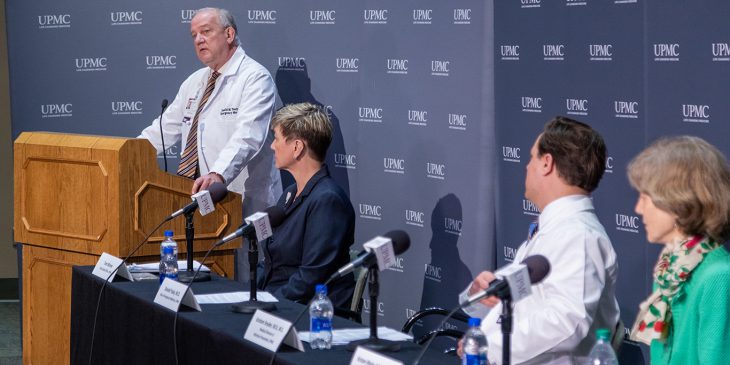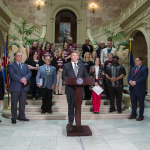Today, UPMC held a media briefing in partnership with the Allegheny County Health Department to discuss preparations for the spread of the novel coronavirus, COVID-19.
“From Pittsburgh to Harrisburg to Williamsport and Erie, UPMC is the trusted source for medical information and care,” said Dr. Don Yealy, chair of emergency medicine at UPMC and the University of Pittsburgh School of Medicine. “We are a world class academic medical center. That means that we provide outstanding patient care and do research to improve that medical care. In this current health care challenge, these features again help us respond to the needs of our community near and far.”
COVID-19 was first identified in Wuhan, China, in December 2019. Since then, the virus that causes it has spread across the globe, causing nearly 90,000 cases worldwide. Symptoms of COVID-19 include fever, cough, and shortness of breath. While the majority of people recover from COVID-19, the disease can be life-threatening to older patients or those with weaker immune systems.
Tami Minnier, chief quality officer, UPMC, explained that UPMC is prepared if a COVID-19 case should come to our communities. “Right now, we do not have any known cases in Pennsylvania or the communities that UPMC serves,” she said. “If that changes, we have been putting measures in place since early January to quickly respond. We have always had solid plans to care for emerging diseases.”
Dr. Graham Snyder, medical director of infection prevention and hospital epidemiology at UPMC, said that the FDA recently announced they are expanding permission for COVID-19 diagnostics to qualified labs nationally.
“We are working quickly to develop our own testing capabilities so that any cases can be identified more rapidly,” he said.
 Past experiences preparing for a pandemic make UPMC the top source for care and information regarding COVID-19. “In developing our COVID-19 preparedness measures, we started ahead of the curve, building from what we’ve learned from these previous epidemics,” Dr. Snyder said.
Past experiences preparing for a pandemic make UPMC the top source for care and information regarding COVID-19. “In developing our COVID-19 preparedness measures, we started ahead of the curve, building from what we’ve learned from these previous epidemics,” Dr. Snyder said.
UPMC’s preparedness efforts have been extensive. UPMC has established screening guidelines to effectively determine whether a patient may be sick with COVID-19 and has a dedicated hotline to field questions and potential cases from frontline staff.
“As an organization, we’ve had systemwide communication, whether staff are in a rural hospital or in Pittsburgh,” Dr. Snyder added. “We’re making sure they’re prepared.”
UPMC also has dedicated efforts to ensure staff stay safe while caring for patients. “We have a strong supply chain system in place to ensure we are receiving an adequate supply of personal protective equipment,” Dr. Snyder said. “We keep a rotating stockpile in several secure locations.”
UPMC has temporarily suspended all business travel to Italy and China and has asked any staff who travel to these or other affected countries for personal reasons to report to Employee Health for monitoring.
Over the weekend, the Centers for Disease Control and Prevention (CDC) changed its screening recommendations to include people with no recent travel to any country experiencing an outbreak. Dr. Yealy explained that UPMC has updated its screening accordingly. “We still have not had any highly concerning cases, but we have trained staff to know what to do next when caring for a COVID-19 patient.”
screening recommendations to include people with no recent travel to any country experiencing an outbreak. Dr. Yealy explained that UPMC has updated its screening accordingly. “We still have not had any highly concerning cases, but we have trained staff to know what to do next when caring for a COVID-19 patient.”
While there is currently no vaccine or preventive treatment for COVID-19, there are a few simple things people can do to protect themselves from the virus:
- • Wash your hands regularly or use hand sanitizer
• Cover your cough and sneeze
• Stay home if you’re sick
Dr. Snyder also pointed out that the CDC does not recommend healthy people wear face masks to protect themselves from COVID-19. While masks may serve a purpose in health care settings, Dr. Snyder explained that people who are not used to wearing masks may actually touch their face more, potentially exposing them to infection.
Dr. Yealy stressed if someone thinks he or she may have COVID-19 and does not need emergency attention – such as in the case of difficulty breathing, that person should call a primary care physician or local Emergency Department first before arriving. UPMC AnywhereCare is another way to get medical evaluation without leaving home.
UPMC will be regularly updating the community on this developing situation. Follow UPMC News for updates.








